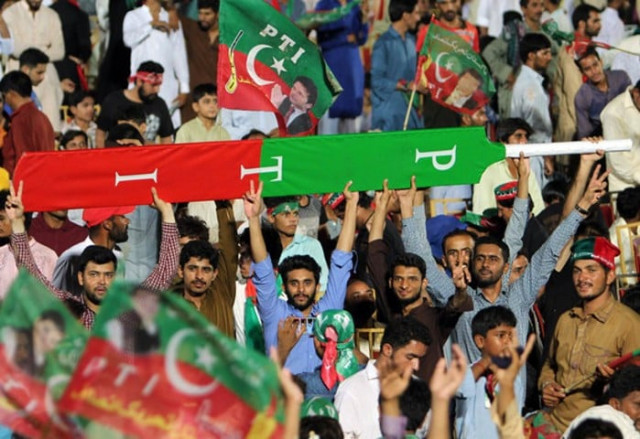PTI's unexpected falter in Rawalpindi division
Former ruling party failed to retain any seats in the historically significant region

The Pakistan Tehreek-e-Insaf (PTI) encountered a setback on February 8 polls by failing to secure any seats in the National Assembly from the Rawalpindi division, historically considered a martial area with a rich tradition of military service.
Since the British rule era, districts like Attock, Chakwal, and Jehlum in Rawalpindi have been recognized as significant sources of military recruits, with soldiers hailing from the areas participating in both world wars.
Moreover, even after partition, a majority of young people from these regions have shown a preference for joining the Pakistan Army, Air Force, and Navy.
In the 2018 general elections, PTI celebrated victories in the majority of MNA seats in Rawalpindi division and Islamabad Capital Territory (ICT), causing Pakistan Muslim League-Nawaz (PML-N) to lose all seats.
However, the February 8 general elections brought a surprising turn of events, with PTI failing to retain any seats in this historically significant region. Allegations of massive rigging in the final results have been raised by PTI-backed independent candidates, particularly concerning the issuance of Form-47 by the Election Commission of Pakistan (ECP).
Many candidates argue that the results indicating their victories have been collected through Form-45, distributed by presiding officers to their polling agents after the counting at polling stations.
Interestingly, a majority of PTI candidates in these districts had enthusiastically celebrated the unofficial results on the night of February 8.
However, the scenario took a turn when Returning Officers (ROs) issued Form-47, showing the defeat of PTI-backed independent candidates and the declaration of PML-N candidates as the victorious contenders.
Read also: ‘Power-wielders’ must learn to respect people’s choice: PTI
Complaints have arisen from PTI-backed candidates, alleging that they were denied entry into ROs' offices during the counting process.
Even though the official results show their defeat, PTI-backed candidates garnered substantial votes, raising eyebrows among powerful circles and opposing parties alike.
It is learned that these candidates are considering challenging the ROs' results soon, with protests being staged outside ROs' offices.
It is pertinent to note that electoral defeat comes as former spymasters like Faiz Hameed and Zaheerul Islam Abbasi, who were seen as tilted towards PTI in the past, are no longer in service.
Observers noted that the defeat of PTI-backed candidates carries several implications, signalling that the PTI narrative may not be the key to success in elections.
The debate has now shifted to whether the judiciary will provide relief to PTI in election disputes. Although election matters can only be challenged in the election tribunals under Article 225 of the constitution, PTI candidate Salman Akram Raja, an advocate, has already approached the Lahore High Court (LHC) against election results issued by ROs.
Read: PTI's Shoaib Shaheen to seek 'legal recourse' against NA-47 results
PTI's disappointment with the Supreme Court, led by Chief Justice Qazi Faez Isa, for declaring intra-party elections as illegal has further strained the relationship. PTI withdrew a contempt petition against the Election Commission of Pakistan (ECP) and others, expressing a lack of hope for relief during the elections.
An important aspect revolves around the allocation of reserved seats to PTI. The majority of lawyers believe that PTI should be granted reserved seats, and questions arise about whether PTI-backed independent candidates can form a parliamentary party.
With the invalidation of intra-party elections, the question arises: who will assume the role of the party head and provide guidance on the applicability of Article 63-A of the constitution?
A senior government official emphasised the need for clarity on the interpretation of Article 63-A to deter the defection of independent candidates who were backed by the PTI.
Article 63 A (2) of the Constitution says that a member of a house shall be deemed to be a member of a parliamentary party if he has been elected as a candidate or nominee of a political party which constitutes the parliamentary party in the house or, having been elected otherwise than as a candidate or nominee of a political party has become a member of such parliamentary party after such election by means of a declaration in writing.
In view of this provision, there is a need to get clarification about the party 'nominee' and candidate'.
Lawyers believe that awarding three convictions to Imran Khan sent the wrong message to the public. Despite these hurdles, the public voted for PTI-backed candidates.
A political leader not affiliated with PTI suggested that female voters were displeased with the Iddat case decision and mostly voted for PTI-backed candidates.
This situation also poses a test for the Supreme Court, examining how it will restore public faith in the judicial system.



















COMMENTS
Comments are moderated and generally will be posted if they are on-topic and not abusive.
For more information, please see our Comments FAQ